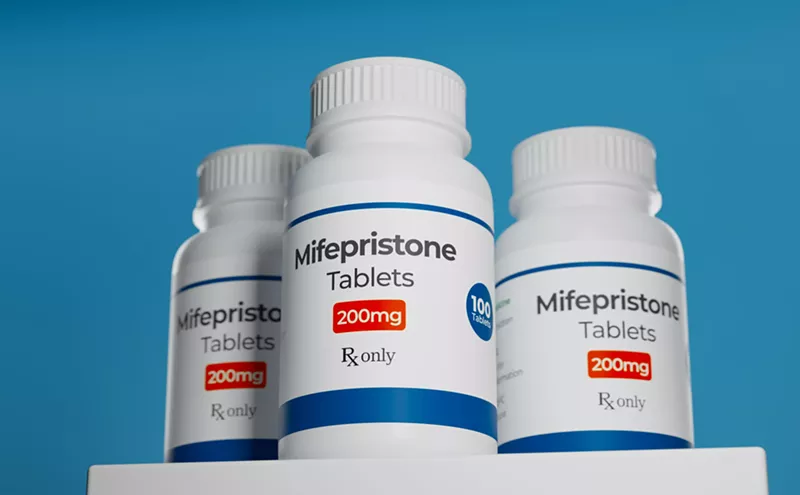Neuticles are testicular implants for pets. Produced by Missouri-based CTI Corp., the implants are available in different styles and sizes to fit cats, dogs, horses and bulls. Business has been strong, especially in Texas, where more Neuticles have been sold than in any other state except California.
"Texas is a very macho state," says CTI owner and entrepreneur Gregg Miller. "When a male dog becomes female in appearance, it's offensive to some pet owners."
Miller, 50, is a soft-spoken man who is passionate about his product. A former candy king who made millions on the invention of the "sweet tube," a long plastic tube that squeezes out jelly candy, Miller had accounts with Wal-Mart and Disney before he cashed in his savings to help a friend, a bloodhound named Buck.
Buck would catch the scent of a bitch in heat and wander for miles, Miller says. When the dog was found 30 miles away, Miller says, he knew it was time to neuter Buck. Still, he hesitated.
"No one knows the horror of neutering until the day comes and you put your dog in the car knowing he's going to be emasculated," he says. "It's traumatic for the pet and for the owner."
Miller remembers the day after Buck's surgery, a day that changed his life. "He woke up. I said, 'How are you, Bucky?' He gave me his paw, and I shook his hand. He went to clean himself, and I'll never forget the look on his face. He looked down and didn't do anything but look up at me, then look back down and back up with those big bloodhound eyes. 'Where in the world did they go?' he was asking. After that, he acted extremely depressed for three days."
When Miller inquired about testicular implants, he was surprised to learn there were none. Surely, he says, he was not the only man who felt that by neutering he was a traitor to his sex.
With that thought in mind, Miller began two years of extensive research and design. He contacted his local veterinarian and asked him to fashion a set of canine testicles out of clay, then sent the model to a molder. Two years and $500,000 later, Miller had a patented product and a patented surgical procedure. In 1995, a police dog received the first set of implants, and Canine Testicular Implants Corp. was born.
Prosthetic testicles, it turns out, are big business. More than 100,000 animals have received Neuticles. The company sells an estimated 1,000 sets a month at an average of $110 a pair. More than 8,000 clinics across the nation and in 32 countries have ordered the product.
Neuticles come in two styles--original and natural. The less expensive "original" model is made of polypropylene and has a firmer, almost plastic rigidity, while the newer, "natural" brand is molded out of solid silicone and has a softer, spongier feel at twice the price. They come in five sizes, and the average kidney-shaped testicle fit for a collie measures an inch and a half long.
"You can tell [they're fake] if you touch them," says Trula Salazar of Houston, who had testicular implants put in her dog Brody. "I got him the cheaper ones. They don't sag as much as they should; they're tight up against his body."
But neutering means the end of a show career for dogs, and Salazar, who shows pit bulls, felt that was unfair. She opted for Neuticles and continued to show Brody, but not at American Kennel Club events. "It's not like they're going to ask, and the judges can't tell the difference," she says. "They don't touch back there the way they do like at AKC shows."
While the company sells more canine implants than any others, pet owners can customize their orders. Neuticles have been implanted in rats in a lab at the University of Louisiana, a rhesus monkey in Arkansas, a pair of water buffalo in Colorado and a prairie dog in Kansas. One request even came in for a hamster-sized set. Most of the orders for bull implants come from Spain, and for horse implants it's Australia.
Veterinarians are forthcoming about the benefits of neutering for curbing persistent behavior problems such as mounting, marking, fighting and roaming, but responses to testicular implants are varied. Mentioning them is as apt to elicit a chuckle as an endorsement.
Angie Salazar, surgical director at Hillside Veterinary Clinic in Dallas, has performed two testicular implants, both on former show dogs that were owned by women. "I don't think Neuticles are a silly thing," she says. "It's a really important facet to the owners. The dog is like a second child to them. They wouldn't neuter their children, much less one of their pets," she says. But when asked whether she put implants in any of her male dogs, she laughed. "No."
Neuticles literature claims the product allows a pet "to retain his natural look, self-esteem and aids in the trauma associated with neutering."
"Any time you do any surgery it's a traumatic experience to some extent," says Kenneth Williams, a veterinarian at Heights Veterinary Services in Houston. "As far as psychological problems, we've not experienced that. I do have a Boston terrier, male, who was neutered at the appropriate age. It didn't bother him one way or another."
Williams says for every 200 dogs neutered, there is one inquiry or request for implants. The cost of neutering ranges from $150 to $250. Slipping in a set of Neuticles may add $20 to the bill, not including the cost of the implants, provided there are no complications as can arise when an owner wants to move up a size, Williams says.
Neuticles owner Miller said many times owners are tempted to give their dog the illusion of a more robust character than nature intended. But he warned that overpadding the sacks will cause inflammation and might lead to more serious complications, such as one beagle whose scrotum was dragging the floor after its owner had replaced the dog's small testicles with large Neuticles.
"Neuticles are more for the client than the patient," Williams says. "A lot of times it's the clients themselves who trade places with the animal, and they don't want to be neutered."
"I wouldn't want mine chopped off," says 25-year-old Tony McManus as he and his wife, Jennifer, watch their dog play at Dallas' Lakewood dog park. Though the couple are convinced that neutering their dog changed him for the worse, they say they wouldn't spend money on prosthetic testicles.
"I'm not sure if another surgery and some fake ones would make him feel better," Jennifer says. "It seems extravagant."
Dave Vanverstelt threw a ball for his 2-year-old English bulldog, Benson. Vanverstelt says only his desire to breed his dog made him balk at the idea of neutering. Benson had an undescended testicle--a precursor of cancer--so Vanverstelt acted on his vet's advice and had the dog neutered.
"Yeah, I've heard of implants," he says. "It's an owner issue, but what do you expect? Dallas is just behind Los Angeles for plastic surgery. It's the insecurities of men coming through."
At Houston's busy Riverside Animal Hospital, a low-cost animal clinic, veterinarian Karen Kemper says she has been on the company's master list of clinics that offer the procedure since ordering a set as a gag gift for a friend, but she turns away clients asking for Neuticles. "Let me put it to you this way. It depends on what kind of practice you're in," she says. "It's not complicated, but it's a delicate surgery; you do a lot more than you regularly do in neutering with the preservation of sheaths and structures. We don't have a lot of owners who have discretionary income to spend...to have the procedure done."
Traditional neutering at the clinic costs $75 compared with $300 to $400 to implant Neuticles.
Kemper says the whole business over implants boils down to vanity. "Owners don't want the dog to look neutered--that's about the person. Neuticles do nothing as far as hormone balance or anything like that. Dogs operate on scent. Think about it. A dog can't tell if a longhaired dog has testicles, but it can still identify it as male or female. It's strictly a visual thing for two-legged people."
Miller, however, says that responses such as Kemper's infuriate him. "Fifty percent of vets nationally won't do it...and most will charge a criminal amount of money, but it's a two-minute procedure. It's as simple as changing a light bulb.
"We're after ultra-loving pet owners who want their dog to have the very best, who don't want them to suffer, who want a dog that looks like a male dog."












